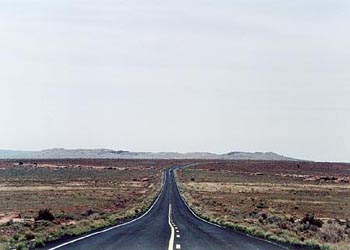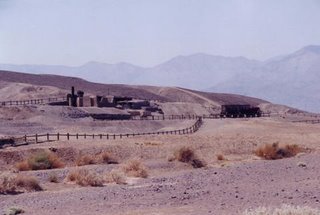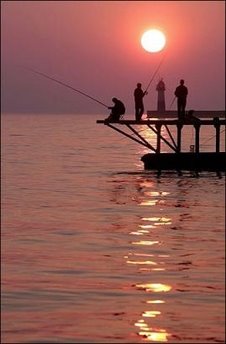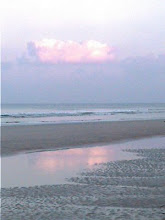There are lots of lonely roads like this out west. This one leads to Meteor Crater: the best preserved meteorite impact site on Earth.
50,000 years old
4100 feet across
Over 3 miles in circumference
570 feet deep
Look closely and you will see the little camp at the bottom of the crater.
Wednesday, May 31, 2006
Tuesday, May 30, 2006
Saturday, May 27, 2006
Friday, May 26, 2006
Sunset Fishing
Jeans Art
Monday, May 15, 2006
Harold Washington Library - Chicago
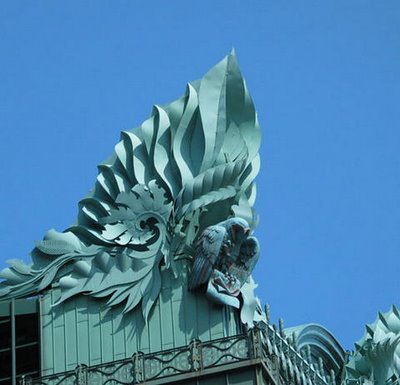 In 1993, seven ornaments were added to the roof. They are placed on each of the four corners, as well as in the centers of the State, Congress, and Van Buren sides. The State Street ornament is a sculpture of an owl, and the Congress and Van Buren ornaments incorporate seed pods, which are symbolic of the natural bounty of the Midwest. The ornamentation at each of the four corners includes a small owl perched in the foliage.
In 1993, seven ornaments were added to the roof. They are placed on each of the four corners, as well as in the centers of the State, Congress, and Van Buren sides. The State Street ornament is a sculpture of an owl, and the Congress and Van Buren ornaments incorporate seed pods, which are symbolic of the natural bounty of the Midwest. The ornamentation at each of the four corners includes a small owl perched in the foliage.
Sunday, May 14, 2006
Joys of my life

This photo was taken in 2000. Though they live in different places in the US now, they are still very close. I must have done something right to have them love each other so much and that makes me happy to know they are good to each other and very close in heart. It's all the Mother's Day gift I need.
Saturday, May 13, 2006
My favorite place in Chicago
Wednesday, May 10, 2006
Bottlenose dolphins
The Eiffel Tower
 The Eiffel Tower shows blue lighting to mark Europe's Day early Tuesday, May 9, 2006, in Paris. May 9 marks the anniversary of the speech made by French Foreign Minister Robert Schuman in 1950 which led to post World War II Europe creating a pan-european organisation which has grown into the present day E.U. (AP Photo/Jacques Brinon)
The Eiffel Tower shows blue lighting to mark Europe's Day early Tuesday, May 9, 2006, in Paris. May 9 marks the anniversary of the speech made by French Foreign Minister Robert Schuman in 1950 which led to post World War II Europe creating a pan-european organisation which has grown into the present day E.U. (AP Photo/Jacques Brinon)
Sunday, May 07, 2006
German Willi Chevalier, world champion freestyle chin beard 2005
 German Willi Chevalier, world champion freestyle chin beard 2005, poses during the International German Beard and Moustache Championships in Hesel, northern Germany, on Saturday, April 29, 2006. Some 100 participants from eight nations compete to become world champion in one of 16 beard and moustache categories. (AP Photo/Kai-Uwe Knoth)
German Willi Chevalier, world champion freestyle chin beard 2005, poses during the International German Beard and Moustache Championships in Hesel, northern Germany, on Saturday, April 29, 2006. Some 100 participants from eight nations compete to become world champion in one of 16 beard and moustache categories. (AP Photo/Kai-Uwe Knoth)
Thursday, May 04, 2006
Wednesday, May 03, 2006
Starved Rock and the Great Illinois River
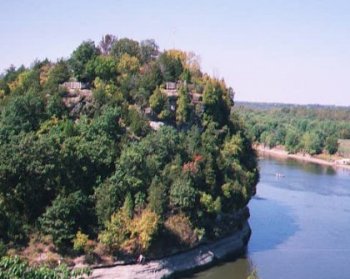

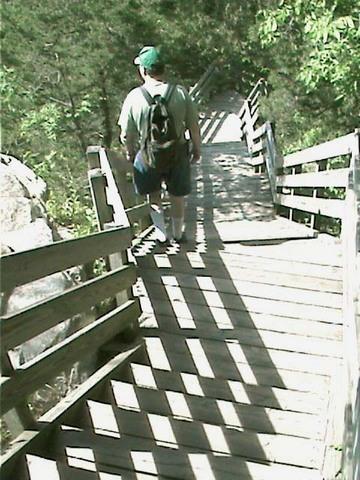
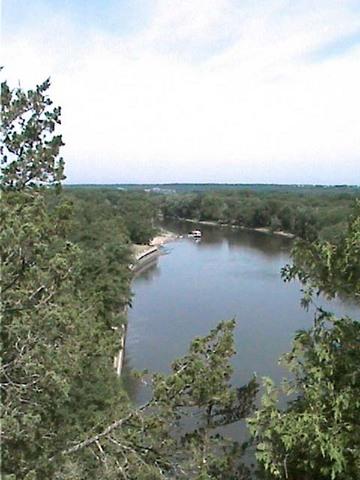
I used to come here a lot with my family when I was a child. Much has changed about Starved Rock State Park. When we were kids there was no wooden decking with railings. My mother would warn us not to go too close to the edge or we would suffer the same fate that many boy scouts and other people had when falling to their deaths into the shallow banks of the Illinois River.
Starved Rock State Park is located 1 mile south of Utica on the Illinois River. This 2,630 acre park receives more than two million visitors each year and it's no wonder why when you see the bounty of beautiful sites the park has to offer. Starved Rock itself is a sandstone butte that towers 125 feet above the river. There are six spectacular overlooks within the park for viewing the fascinating rock formations and wildlife. The park is home to 18 stream-fed canyons that sprout waterfalls in spring months. There are 16 miles of marked hiking trails that cover the park and offer scenic views of bluffs, canyons, and the river. Other activities available at Starved Rock include fishing, boating, camping, and picnicking.
The Starved Rock Lock and Dam is located at the Illinois Waterway Visitor Center, approximately two miles east of Route 178 in Ottawa, Illinois.The Starved Rock lock and dam is one of eight between Lake Michigan and the Mississippi River. The Illinois Waterway, as it is called, was finished in 1933 to make the shallow Illinois River usable for commercial traffic
Established in 1911, Starved Rock State Park is Illinois' second oldest state park, but the majority of Starved Rock's history occurred centuries before the park's existence. There is evidence of archaic Indians having lived in the park area as far back as 8000 B.C. From the 16th century through the 17th century, five to ten thousand Illiniwek Indians were thought to have inhabited the area.
The first Europeans to enter this area were Louis Joliet, Father Jacques Marquette and five companions while exploring the Illinois River in August 1673. In the 1680's, after Robert LaSalle claimed the Mississippi River Valley for France, a chain of forts was established to protect France's new territory. Fort St. Louis was built in 1682 on Starved Rock. It was abandoned in 1702 and completely destroyed by a fire in 1720.
So where does the name Starved Rock come from? A Native American legend tells of a band of Illiniwek Indians who sought refuge on the butte. They were surrounded by a group of Ottawa and Potawatomi Indians, their enemies. Unable to come down alive, they eventually starved to death on the butte.
Monday, May 01, 2006
Subscribe to:
Comments (Atom)
